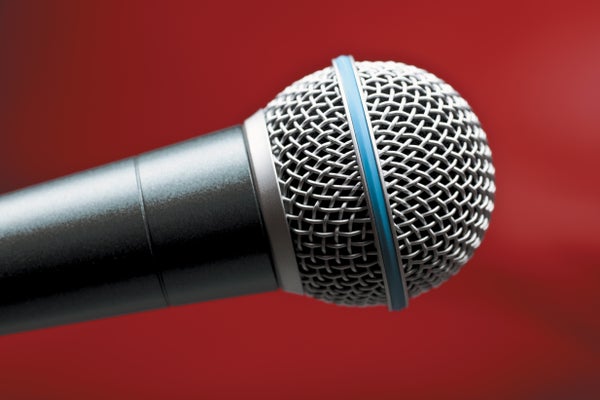Like hundreds of millions of other people around the world, Brian Scholl, a psychologist and cognitive scientist at Yale University, spent much of the COVID pandemic on Zoom. But during one digital faculty meeting, he found himself reacting unexpectedly to two of his colleagues. One was a close collaborator with whom Scholl usually saw eye to eye, and the other was someone whose opinions tended to differ from his own. On that particular day, though, he found himself siding with the latter colleague. “Everything he said was so rich and resonant,” Scholl recalls.
As he reflected afterward, Scholl realized there was a key underlying difference between the two men’s delivery: the colleague with whom Scholl usually agreed had been using the junky built-in microphone of an old laptop, whereas the one with whom he typically disagreed had called in from a professional-grade home-recording studio. Scholl began to suspect that it was the quality of their sound, rather than the content of their arguments, that had swayed his judgment.
Research published earlier this year in the Proceedings of the National Academy of Sciences USA suggests Scholl’s hunch was correct. In a series of experiments, he and his colleagues found that poor audio quality consistently caused listeners to negatively judge speakers in a variety of contexts—even if the message was exactly the same in all of them.
On supporting science journalism
If you're enjoying this article, consider supporting our award-winning journalism by subscribing. By purchasing a subscription you are helping to ensure the future of impactful stories about the discoveries and ideas shaping our world today.
“When chatting on Zoom, everyone is familiar with how they look, but we don’t typically take into account how we sound to other people,” Scholl says. “It turns out this can really drive people’s impressions of how intelligent you are, how credible you are, and how datable and hirable you are.”
The human brain evolved to make intuitive judgments about people not solely on the basis of what they say but also according to how they sound. Ample research has shown that factors such as how confident a person sounds or whether they have an accent influence how others perceive them. Scholl wanted to see whether this tendency would hold when the only difference was technological distortion.
Scholl, working with Robert Walter-Terrill and Joan Danielle Ongchoco, both then at Yale, created audio recordings in which a human man or woman or a computerized male or female voice read one of three scripts. Each script dealt with a different topic: the reader posed as a job applicant, a potential romantic partner or someone describing a car accident. Some of the recordings were clear; others were manipulated to sound tinny. “We tried to use a manipulation that’s relevant to daily life,” Scholl says. “If you spend time on Zoom, you probably know tons of people who sound like this.”

yasinemir/Getty Images
The researchers recruited more than 5,100 people online. Each participant listened to one script and then answered simple questions about their judgment of the speaker by choosing a rating on a continuous scale. The team ensured that the participants actually understood what they had heard by asking some of them to transcribe the recording they had listened to after they answered the questions.
Across all three scripts and for both human and computerized voices, participants consistently rated the tinny voices as less hirable, datable, credible and intelligent. The findings speak to the “deep power of perception,” Scholl says, and its ability to make us behave irrationally. “Everybody knows that this kind of auditory manipulation does not reflect on the person,” he says. “But our perception is operating, in some ways, autonomously from higher-level thought.”
Nadine Lavan, a psychologist at Queen Mary University of London, who was not involved in the research, says the findings are somewhat expected given what researchers already knew about how we evaluate other people. “But a lack of surprise doesn’t mean the results are not important or interesting,” she says.
The study raises questions, Lavan continues, about how much of an effect microphone quality may have in more complicated real-world settings. Job applicants, for example, “don’t tend to read out their applications; they tend to give more spontaneous answers,” she says. “Also, abstract ratings of credibility and of being hirable are informative, but real-life hiring decisions tend to include higher stakes and much more complex trading off of different factors.”
Assuming the findings do hold in the real world to some extent, Scholl says the takeaway lesson is clear: “You should really find out how you sound to other people online. And if you don’t sound good, take some remedial action,” he says. Scholl adds that this idea worked for his tinny-sounding colleague, who eventually upgraded to a better microphone.
